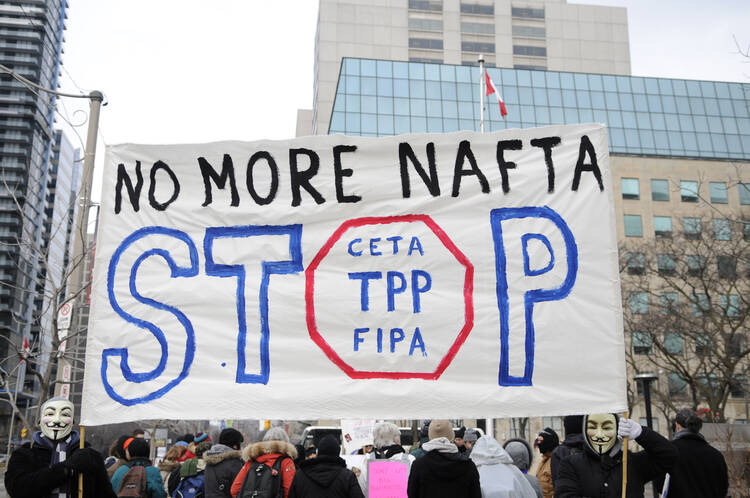Partnership Review
After years of negotiation, the Trans-Pacific Partnership is finally on its way to a last assessment in Washington. Congress members had given fast-track authority to the Obama administration to negotiate the deal; that does not mean they should rubber stamp it now.
The partnership was built off the blueprints of previous free trade agreements, whose long-term results have not lived up to their initial promises. Those previous F.T.A.’s were sold as job and wealth creators. For roughly a million U.S. workers, though, the North America Free Trade Agreement led to life on the dole or low-skilled employment at substantially reduced wages. And exports of subsidized U.S. corn drove subsistence farmers off the land in southern Mexico, contributing to the undocumented labor force now vilified by opportunistic presidential candidates.
The T.P.P. was also negotiated in secret. Advisory committees established by the Obama administration tilted heavily in favor of business interests. As a result, protectors of the environment, advocates for global health and supporters of workers’ rights have good reason to be anxious about this partnership’s real-world outcomes. That closed-door process repeats an unacceptable pattern of exclusion that alone should merit a congressional rebuke of the partnership in the coming weeks.
Pope Francis proposes an alternative of integral development based on full participation and dialogue, with the aim of promoting responsible and sustainable use of creation and authentic and equitable development. This “new” partnership is based on an old template of negotiated trade-offs among competing corporate interests that may once again only definitively benefit a small minority of the stakeholders in global trade. That model is not worth repeating in the 21st century if a different outcome from international trade—one that offers clear benefits to all—is the true goal.
One Innocent Man?
On Nov. 6, for the fourth time in under a year, Richard Glossip will wake up ready to be executed—or at least as ready as any man can be who has maintained his innocence for 17 years on death row.
In 1997 Justin Sneed, a maintenance worker at a Best Budget Inn in Oklahoma City, admitted to killing the motel’s owner. Mr. Sneed claimed that Mr. Glossip had hired him to murder their boss and was given a life sentence in exchange for his testimony against his alleged co-conspirator. After multiple trials, appeals, execution dates and last-minute stays, Mr. Glossip was again scheduled to be killed on Sept. 30. At the 11th hour, faced with an outpouring of support from people convinced of the inmate’s innocence (led in large part by Helen Prejean, C.S.J., well known for her work to end the death penalty), Oklahoma’s Gov. Mary Fallin delayed the execution for another 37 days to give correction officials time to review the state’s lethal injection protocol, which has been closely scrutinized after a series of botched executions across the country in 2014.
In a historic speech before Congress on Sept. 24, Pope Francis renewed his call for the abolition of the death penalty, saying, “I am convinced that this way is the best, since every life is sacred…and society can only benefit from the rehabilitation of those convicted of crimes.” The United States has been ranked as high as fifth in the number of executions carried out each year, behind China, Iran, Iraq and Saudi Arabia. In Oklahoma, 10 people on death row have been exonerated. Even if Mr. Glossip is guilty, Americans must ask what is to be gained from his execution. And if he is innocent, what do we as a country lose?
Tragedy in Kunduz
The recent bombing of the Doctors Without Borders hospital in Kunduz, Afghanistan, by an American aircraft that killed at least 10 patients and 12 staff members is another tragic moment in the United States’ longest war. It occurs when countries like Syria, Libya, Yemen and Iraq are foundering despite or, in some cases, because of American military intervention.
The hospital cared for wounded Afghan citizens and Taliban soldiers alike. In the preceding week the staff of 180 had treated 400 victims of the war, and the Taliban had agreed to not enter the hospital with weapons. Nevertheless, in a series of events still being investigated, a U.S. aircraft designed for night attacks on terrorist targets, relying on visual targeting, hovered above the target at 7,000 feet, firing weapons. Whether U.S. advisers or Afghan forces called for the attack is under investigation. Survivors have told the press that there were no Taliban fighters in or near the hospital and that when officials called American headquarters and told them they were bombing the hospital, it took a half hour before the attack let up.
Doctors Without Borders has left the city and is calling for an independent investigation. What had been a model of reconciliation has been reduced to another cause for anger. Although the Taliban have caused most of the civilian deaths, events like this, because they involve foreigners, stir local rage. Under international law, to deliberately bomb a hospital is a war crime. Whatever the investigations underway conclude, this must never happen again.








